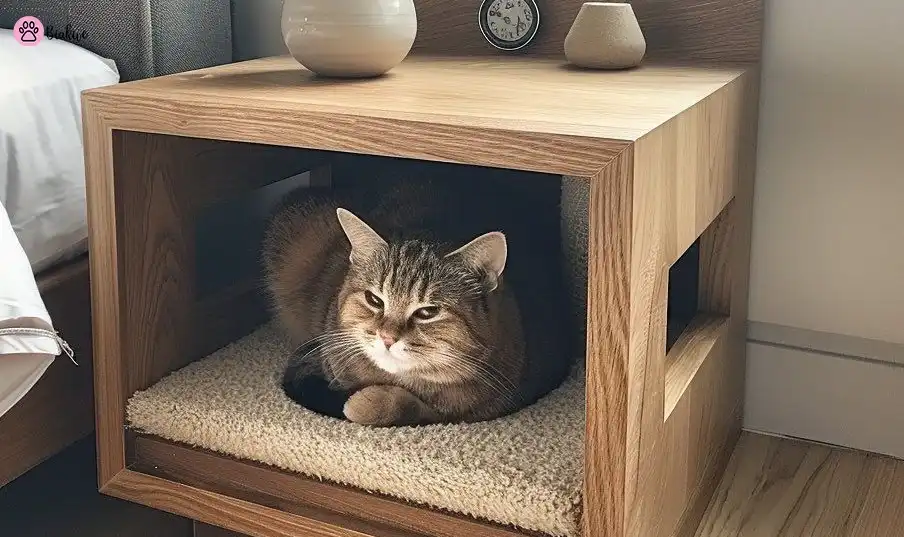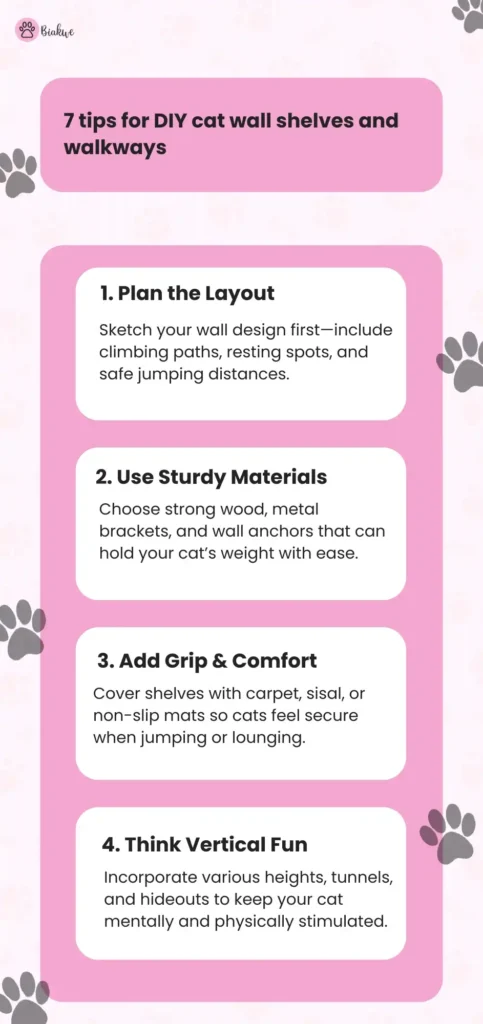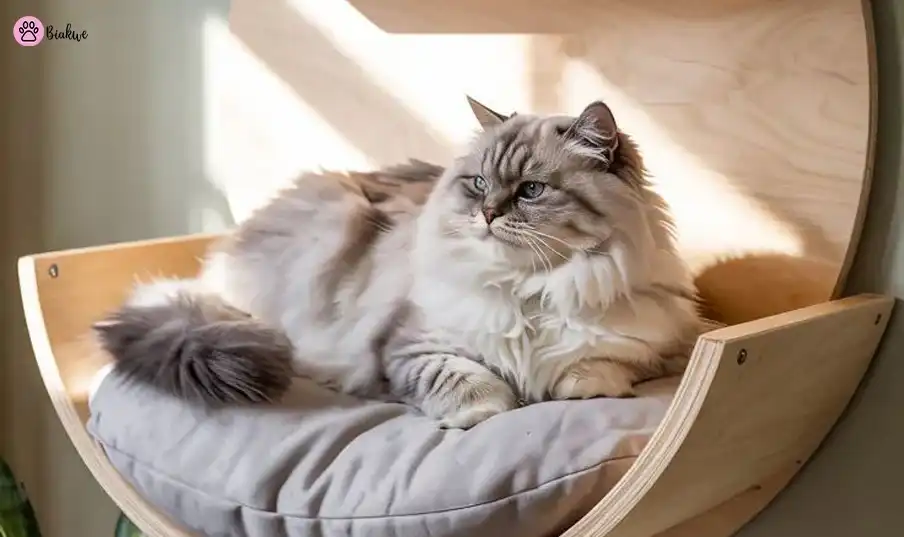Cats like to explore, jump, and climb. That is why a cat walkway and wall shelves are an interesting and clever solution for any cat parent. I am the owner of 2 cute cats.
I recently made a cat walkway for them, and they love them. The wall-attached routes and perches provide my cats with a playground within your house.

It is also a great exercise and provides a means of reducing boredom and feeling safe up high in the case of indoor cats.
Besides, it saves space on the floor and makes your home clean. I feel so relaxed seeing my cats enjoy.
But in the present blog, you are going to find out 7 easy steps on how you can make your do-it-yourself cat walls and walkways in your home. You do not need to become an expert with gadgets to implement these tips since they will assist you in making the place safe, cozy, and exciting, and your cat will adore it.
Why Build a Cat Walkway at Home?
- House cats require means of exercising and being happy. You can have a cat walkway on your wall that is fun for the world of a cat.
- It offers more climbing and jumping, and resting spots for your cat. This sort of plan keeps your cat’s mind and body active, and so less stressed and bored.
- Shelves in the walls also help in conserving space within your house. Rather than having big cat trees on the ground, you can take your walls and construct them up, and free more space to play.
- It would fit in small apartments as well. Your home will become larger for your cat with the addition of vertical spots.
- It will take only a couple of shelves and a few common tools to create an enjoyable and secure environment that your cat will enjoy exploring daily.
Tip 1: Choose the Right Wall Area
- Part of the preparation of a cat walkway on the wall requires that you find the most suitable location. Find a clear and wide wall that does not have any wires, sharp corners, or anything fragile around it.
- Your cat requires adequate space to roam around, leap, and land.
- Interestingly, it is quite good to be close to a window. Cats are fond of observing the outside world, and the rays of the sun may add additional comfort to the place.
- There is also an option of installing shelves in the vicinity of furniture, such as a table or couch, to enable your cat to find it easy to climb up.
- Ensure that the pathway is free-flowing between the shelves. With a good location, you will provide your cat with an interesting, safe route to wander during each and every day.
Tip 2: Pick Safe and Strong Materials
- The priority in building cat shelves ought to be on safety.
- Make the base of hardwood, like pine or plywood. You also need it to be thick enough that it will not bend under the weight of your cat.
- Then, make every cat shelf tightly fixed using good metal brackets and wall anchors.
- Ensure the surface of the shelf is not slippery but smooth.
- It is possible to place a soft mat or a carpet fragment so that your cat could grasp it with the help of paws. The sharp edges or loose screws need to be avoided.
- A confident and robust shelf gives your cat to climb and play comfortably.
- The higher the quality, the better your homemade cat walkway or shelves will be able to endure and will be safe for your furry companion.

Tip 3: Plan Your Layout
- Take your time and evaluate your work before getting out the tools, and figure out how your cat will be making it from shelf to shelf.
- Cats need an open path with a jump space for themselves. Consider how much your cat can jump and how far he wants to reach.
- When learning how to build a cat shelf then make use of a paper sketch or an online room planner to plan out the walkway.
- Ensure that every shelf is even for the second, without any large spaces.
- You can begin low and go as high as you want – creating a nice climbing space. A smart structure is ergotónicos, keeping your cat active and safe.
- It is also an accident-free cat architecture, allowing hanging a cat on your wall!
Tip 4: Add Variety – Mix Shelves and Walkways
- Make your arrangement an interesting one where you combine various forms of DIY cat wall shelves for a cat walkway on the wall.
- Rather than flat shelves only, use bridges, small tunnels, or ramps. This will make the walkway more entertaining as well as keep your cat wandering.
- Provide vertical and horizontal routes so that your cat can climb, play, and nap.
- Cats would prefer all places in high places where they can place to perch and overhang places where they can jump over.
- You may also erect some cat shelves by the side of furniture to enable your cat to easily jump in and out of it.
- The more different you make the setup, the more your cat will dream of using the wall shelves daily.
Tip 5: Install Shelves at the Right Height
- The height is an aspect to consider when you add a cat shelf to your wall.
- Put the shelves a little lower on that your cat can easily reach them, and then, with time, put others a little higher. This aids your cat in gaining self-esteem as well as climbing without difficulty.
- The space must be short such that your cat does not need to jump so much. Shelves should be made closer to each other in case of elderly cats or kittens.
- Also, ensure that certain cat walkway shelves are at a height where you can pick up your cat in case of need, like 1 to 3 feet high.
- This can be useful to clean, pick up your cat, or add toys.
- The appropriate height makes the waywalking safe, entertaining, and smooth both to you and your cat.
Tip 6: Make It Cozy and Fun
- By including some soft and fun add-ons, you can make your cat shelves a comfortable play area. Some of the shelves should have small cushions or folded blankets to make comfy resting places.
- Also, you can attach hanging toys or scratching pads as a source of amusement for your cat.
- To assist with grip, feel the shelf covering on felt, soft rugs, or pieces of carpet. This will enable your cat to land and climb easily without slipping.
- Cats live and are fond of comfort and diversity. A play where your cat can walk comfortably and where he or she will feel warm and soft will make it come back to that area of your walkway every time.
- You simply need a few addons to make plain shelves your cat would love to spend most of his/her time.

Tip 7: Keep It Safe and Maintained
- Do not forget to periodically check the state of your DIY cat wall shelves after you have installed them.
- Search for any loose screws, shaky boards, or any evidence of damage. A broken cat shelf can also be harmful when the cat is sitting on it.
- Immediately tighten any bolts and replace the parts that are worn. Wash the shelves regularly, once a week, to clean them off, dus,t or fur.
- The walkway is safe and inviting, as all things are kept rigid and new.
- It is your responsibility to ensure that your cat has a healthy and entertaining environment. Occasional inspections are the easiest means of ensuring your cat is safe as he/she entertain him/herself.
For more pet care tips, visit our site Biakwe
